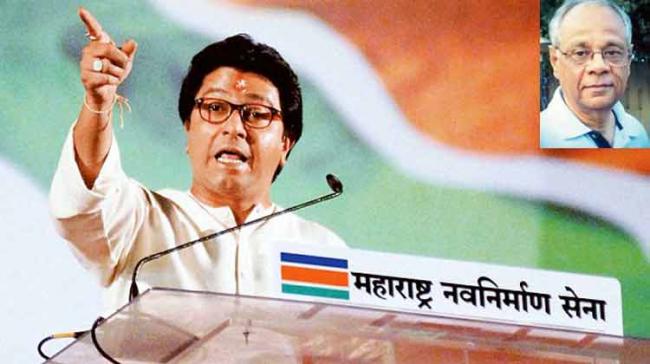Can MNS Win Back Marathi Manoos?

Mahesh Vijapurkar
Political parties are formed for a variety of reasons, including what the Election Commission found that many are probably to find a way to launder money, and delisted 200 of them. There are other reasons as well: Internal disputes, ideological and personal, as well as succession battles. If Mulayam Singh had not given in, there could have been two Samajwadi parties.
Shiv Sena had split when Raj Thackeray formed his Maharashtra Navnirman Sena (MNS) ten years ago which did not pretend to be anything else except an exclusivist party; the Marathi manoos is its primary constituency, and claimed mentorship of Bal Thackeray though it was a succession issue between the Thackeray cousins, him and Uddhav who leads the Shiv Sena now.
There always have been suggestions that the cadre of both the parties would want the two to unite for it was in the interest, as they would put it, of the Marathis. However, the two leaders did not speak of it themselves, and neither did either of them make any moves to rebuild bridges, leave alone get together. In electoral politics, they have been rivals at all levels – civic to legislative.
However, during the run-up to the ongoing elections to ten major civic bodies, including Mumbai, Raj Thackeray sprang a surprise. He called his cousin seven times and found no response. The intent was an electoral adjustment between the two parties, where it was willing to accept almost anything apportioned to it. His emissary too did not get an audience; he had to meet another leader with no benefit accruing.
It was a major development which ended as quickly as it had erupted. The move indicated a certain desperation in MNS leader whose party has been on the decline. Even in Nashik, where with 40 corporators, a third of the civic body, which it controlled, there have been defections to either the Shiv Sena or the BJP. It’s strength in the legislature, of 13 MLAs in 2009 dropped to one in 2014.
A party’s clout is measured in the number of representatives it has in any elected body than the influence it wields on any issue, and in that sense, keeping its presence up in Mumbai, the home turf of Sena and MNS, is critical. Last time, MNS had trounced in the civic elections in the Sena’s heartland – Dadar where the Thackerays had lived, had launched the party from, and located its headquarters.
The rebuff was too hard to digest, but it had to be explained though the Shiv Sena announced that it was not allying pre-poll with any political party henceforth. Raj Thackeray was at pains to clarify that the intent was to avoid splitting the Marathi votes in what is essentially an electoral bout between the BJP and the Sena. This was both a mild threat as well as an apparent admission that MNS didn’t have hopes on retaining that base.
However, a belief exists now among political observers that the overtures to Uddhav was well-crafted gambit to let the world know that if Shiv Sena lost Mumbai civic body to BJP, it was because Sena chose to gamble on the Marathi manoos. Nothing can hurt the Marathi identity more than that for BJP is seen as a non-Maharashtrian party, though not necessarily on facts.
This could well be a clever, post-event analysis because a reason had to be found to explain a political development, but it does not explain why, in the bargain, Raj Thackeray chose to show his weakness, of having to seek an alliance with a party whose leader he hated. It showed up that MNS was much below par for the on-going elections to civic bodies.





